An accelerated theology degree can help prepare you for a career that is meaningful and gives your life purpose.

Theology is defined as the study of God and religious beliefs. A degree in theology is typically not about taking a path to get rich or become famous, although there are some high-paying jobs that can be pursued with a theology degree.
Most earn a degree in theology in order to pursue a career of service in which they can help others or gain a better understanding of life.
A degree in theology can help you explore:
- what you believe in
- why you believe it
- how this applies to your life
Discovering these things can help you guide others as well. There are careers in church ministry, teaching, writing, fundraising, social work, Bible translation, and overseas relief work that can be pursued with a degree in theology.
Editorial Listing ShortCode:
Perhaps you don’t want to spend the next 4 years working away at a degree when you know that people need help now. Maybe you want to be ready and equipped to serve, but you feel attending school for years and building up a huge pile of debt is a horrible way to start your ministry.
It is possible to do big things with limited resources. What if you could have a degree in theology in 18-24 months for less money than you thought possible? Here you can find out how this might be possible!
Types of Accelerated Theology Degree Programs
The types of theology degrees are varied but all focus on the study of God’s nature and revelation to us. You might pursue a bachelor’s degree in religion, religious studies, theology, or apologetics.
Some of the most popular theology majors are:
- Biblical and Theological Studies
- Biblical Languages
- Biblical Scholarship
- Christian Counseling
- Christian Ministries
- Evangelism
- Global Studies
- New Testament
- Old Testament
- Systematic Theology
- Writing and Literature
Which field of theology inspires you most?
Accelerated Theology Degree Programs Overview

When looking for a degree program in theology, you’ll probably want to find a school that aligns with your own personal beliefs. Most Catholic theology students go to Catholic schools, and Protestants usually go to Protestant schools.
No matter which denomination or division of the church you come from, theology classes tend to cover the basic tenants of faith.
Your spiritual growth may be formed by classes such as:
- Foundational Issues in Apologetics
- Christianity and the Cults
- Biblical Studies and Apologetics
- Hermeneutics
- Church History
- World Religions
- Historical Theology
- The Church: Its Mission and Hope
- Old Testament Overview
- New Testament Overview
- Eschatology
Your classes can not only help you learn foundational beliefs but also help you develop the skills needed to teach others.
Careers with an Accelerated Theology Degree
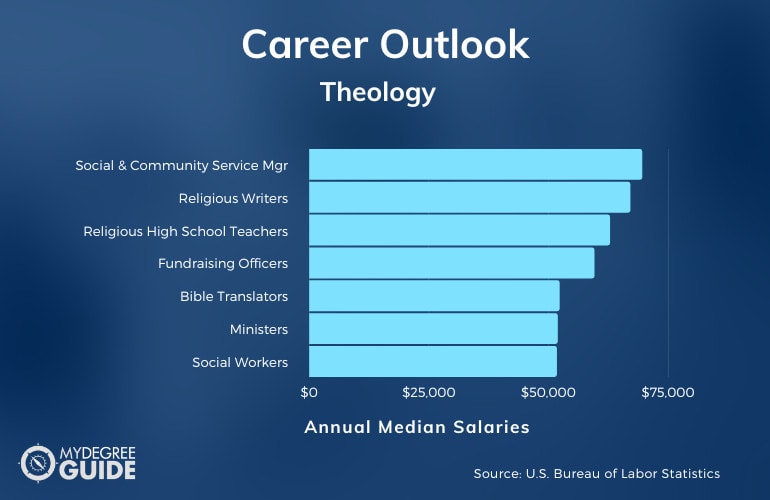
A theology degree will probably not make you rich. Very few people pursue theology careers with the intention of making millions of dollars. Your focus is more likely on making a difference in the world around you.
You still need to pay the bills, though.
Careers in theology can be quite varied, although most are connected with churches, mission organizations, religious schools, and charities. Because of the variety of job opportunities, salaries vary as well.
According to the Bureau of Labor Statistics, these are some of the jobs that can be pursued with a degree in theology:
| Careers | Annual Median Salary |
| Social and Community Service Managers | $69,600 |
| Religious Writers | $67,120 |
| Religious High School Teachers | $62,870 |
| Fundraising Officers | $59,610 |
| Bible Translators | $52,330 |
| Ministers | $51,940 |
| Social Workers | $51,760 |
| Journalists | $49,300 |
| Directors of Religious Activities | $45,110 |
| Missionaries | $33,530 |
There are many who have left higher-paying careers to pursue a humbler life in ministry. Jack Gleeson, famous for his role as King Joffrey in Game of Thrones, left a successful acting career to instead study theology at Trinity College in Dublin.
Pursuing a career in theology may allow you to leave a legacy of hope and change in the world instead of fame and riches.
Also, if you are interested in a career in psychology or counseling, it may be possible to combine this interest with your religious beliefs. A growing number of universities offer either a Christian psychology degree or a Christian counseling degree.
Why Get Your Theology Degree through an Online Accelerated Program?

While there’s certainly something to be said for the mentoring opportunities and peer learning you can receive from on-campus classes, there are also quite a few reasons to pursue an accelerated degree online.
Get started faster!
Once you have committed your mind and your heart to following this path, there is no need to wait to start your degree. Many online universities in North America offer start dates each month. There is no need to wait until the next semester starts.
Finish sooner!
Classes on campus normally run for 16 weeks. Online, accelerated classes are usually 8 weeks long. You can learn the same material but at twice the speed. If you have the time to devote to your coursework, you might finish your degree in half the time.
Learn when and where you want!
Many online classes do not have set class times. This means you can decide when you want to do your schoolwork. You can also decide where you want to do your work because you don’t have to move or commute to campus.
Accelerated online classes are designed to work for students with other commitments.
Depending on your needs and career goals, you might pursue an online bachelor’s, an online master’s, or even an online doctorate in theology.
Editorial Listing ShortCode:
3 Ways to Accelerate Your Theology Degree Even More
Completing your theology degree quicker may not only save you money but also allow you to start serving in your chosen ministry quicker. Using these 3 strategies, you may be able to shave years off the time you spend in school.
1. Test Out of College Classes (Save 1 Year)

Did you know that you may not have to take classes for all of your college credits? Most schools will accept credits earned through the College Level Examination Program (CLEP).
You can register to take the exam, pay an $89 fee (plus service fees), and answer the 90 multiple-choice questions. As long as you get 50% correct, you’ll earn the college credits (usually 3) for that class. You can find exams for classes in the humanities, history, natural sciences, and more.
Many schools will allow you to earn up to 30 credits in this way. This is traditionally 10 classes worth of credits. Usually, it takes about a year to finish that many classes and earn the same number of credits.
You might quickly become a college sophomore just by taking some tests. There are even study guides you can read beforehand.
2. Get College Credit for Your Life and Work Experience (Save Another Semester)

Have you participated in youth ministry or a cross-cultural missions trip? Have you completed training as a worship leader or in children’s ministry? Maybe you served in the military or held a job before entering college.
All of that valuable time you put into serving could potentially earn you credit. Many colleges and universities will award Credit for Prior Life Experience.
At Liberty University, for example, you can earn:
- 9 credits for having done a year with Youth With a Mission (YWAM).
- 6 credits for having a diploma in Child Evangelism
- 3 credits for attending a national worship leaders conference
You may also be able to get credit for military service and workplace training.
Many schools will allow you to earn up to 15 credits this way. That’s traditionally another semester of classes done without going to class!
3. Stay Continuously Enrolled with the Max Courseload

Most students enroll in 15 credits each fall and spring semester, which is typically 5 classes every 4 months. Then they take the summer off, often doing things like working at summer camp or doing a church internship.
There is nothing wrong with this schedule, but it will likely take you at least 4 years to earn your degree this way.
On the other hand, you may be able to almost double the number of credits you earn in a year. Many universities allow you to take up to 18 credits each semester and also offer classes over the summer. In one year, you could potentially earn 54 credits.
If you are also able to earn 30 credits through credit by exam and 15 credits from credit for prior life experience, you could potentially complete your degree in just over 4 semesters, or about 18 months.
Bonus: Transferring Your Existing College Credits

Did you start another degree before you felt the call into ministry? Those credits you earned may be able to be put to good use to meet your theology degree requirements.
To make sure your pre-existing college credit is useful, you can check that:
- Your previous college was accredited
- You earned at least a C in the class
Even if the class doesn’t match any of your concentration requirements, you may still be able to apply the class to your electives.
How to Lower Tuition Costs for Your Theology Degree?

Earning a college degree can cost a lot of money. The good news is that earning your degree might cost you less than you originally planned.
A typical theology degree requires 120 credit hours. That’s a lot of credits to pay tuition for.
If you earn credits by exam or through prior learning, you may not have to pay tuition for those credits. Instead, you’ll have the much lower fees associated with testing and submitting a portfolio.
You may then take advantage of financial aid to lower your personal expenses even more.
You may be able to reduce the cost of your tuition with:
- Grants and loans from the federal government (fill out the Free Application for Federal Student Aid – FAFSA)
- State grants
- College scholarships
- Scholarships from private businesses or organizations
- Tuition assistance from your employer
Using these strategies can potentially reduce the cost of getting your college degree greatly.
Theology Degree Accreditation
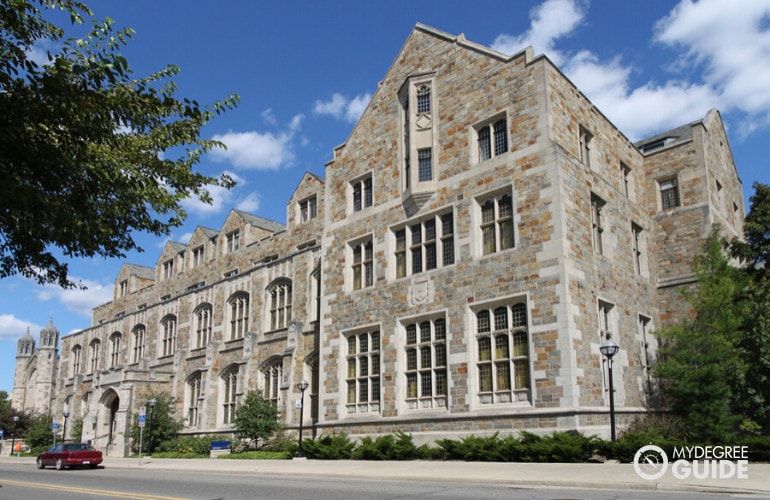
Are you planning to continue your education after you receive a degree in theology? Perhaps you want to add training in education or counseling or continue with a master’s or doctorate in theology. If so, it is important to make sure your degree program will be recognized by other schools.
Regional accreditation adds validity to your degree and is a sign that the school is meeting educational standards.
Degrees from schools with regional accreditation are more likely to be recognized by other programs if you want to transfer or earn another degree. They are also more recognized by employers.
You can also look for specific programmatic accreditation for your theology program. This kind of accreditation is a sign that the program is teaching to the highest standards specifically in the field of theology.
If you are looking for theological accreditation, you can check to see if your school is accredited by:
- The Association of Theological Schools
- The Association for Biblical Higher Education (ABHE)
- The Transnational Association of Christian Colleges and Schools (TRACS)
You can check a school’s accreditation status on their website or on the U.S. Department of Education’s database website.
Universities Offering Online Bachelors in Theology Degree Programs
Methodology: The following school list is in alphabetical order. To be included, a college or university must be regionally accredited and offer degree programs online or in a hybrid format.

American Public University offers an online Bachelor of Arts in Religion program. The program includes a final capstone project on a related topic of the student’s choosing. To graduate, students must complete 120 credits, with up to 90 transferable credits accepted. Applicants must have completed high school and must submit a government-issued ID.
APUS is accredited by the Higher Learning Commission.

Clarks Summit University offers a number of bachelor’s degrees related to theology. Applicants must have a high school diploma. Degree options include Accelerated Pastoral Ministries, Worship Studies, Youth Ministry, Pastoral Ministries, and Camping Ministries. The required credits range from 120 to 151 credit hours and courses last for 8 weeks.
Clarks Summit University is accredited by the Commissions on Higher Education of the Middle States Association of Colleges and Schools and the Association of Biblical Higher Education.
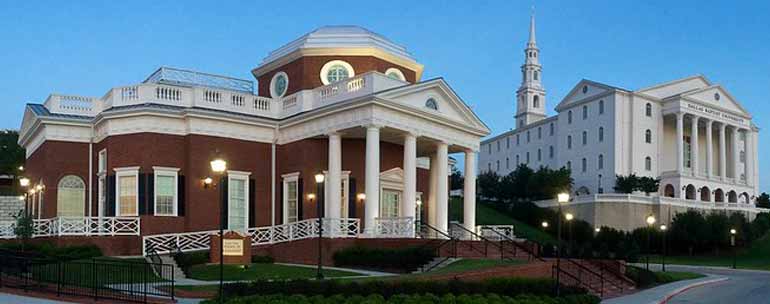
Dallas Baptist University offers 3 online bachelor’s degrees in theology. Students may choose from Biblical Studies, Christian Studies, and Christian Ministries. Each program requires the completion of 120 credits and a GPA of 2.0 or higher to graduate. When applying, applicants must fill out an online form and have a high school diploma.
Dallas Baptist University is accredited by the Commission on Colleges of the Southern Association of Colleges and Schools.
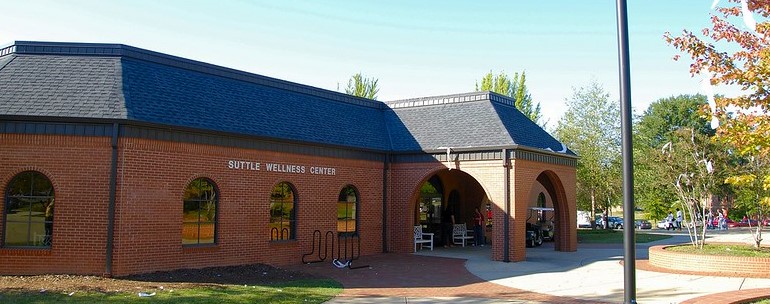
Gardner-Webb University offers an online Bachelor of Science in Christian Studies, a Bachelor’s in Discipleship Studies, and an Accelerated Pastoral Ministries degree. Students must complete roughly 120 credit hours to graduate. Applicants must have a GPA of 3.72 or higher and an SAT score of 1015 or an ACT score of 22.
Gardner-Webb University is accredited by the Southern Association of Colleges and Schools Commission on Colleges.
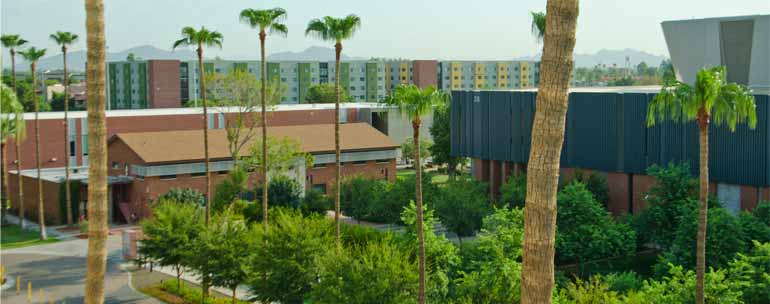
Grand Canyon University offers an online Bachelor of Arts in Christian Studies. Online courses last for 7 weeks. A total of 120 credits are needed to graduate, and students can transfer in up to 90 qualifying credits. Applicants must have a GPA of 3.0, but applicants with a GPA of 2.5 may apply if they have high SAT scores.
Grand Canyon University is accredited by the Higher Learning Commission.
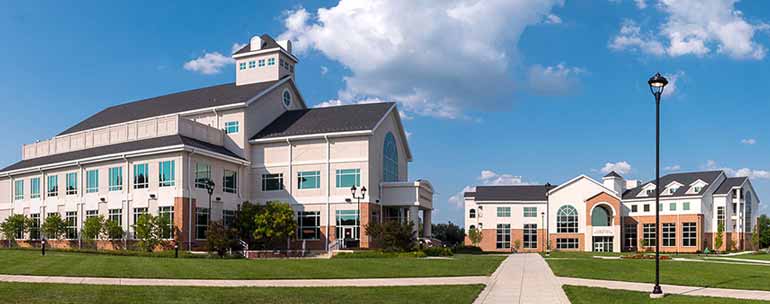
Lancaster Bible College offers online bachelor’s degrees for mature students. Students interested in gaining a degree related to theology may choose between a Bachelor’s in Biblical Studies or in Ministry Leadership. Students must complete 120 credits to graduate. Applicants must have a spiritual life reference and an autobiographical essay.
Lancaster Bible College is accredited by the Middle States Commission on Higher Education.

Liberty University offers an online Bachelor of Science in Christian Leadership and Management. Applicants only need to prove they have graduated from high school. Courses last for 8 weeks, and the program can typically be completed in 3.5 years. Students need to complete 120 credits to graduate, and if they have qualifying credits, they can transfer in up to 75% of the required credits.
Liberty University is accredited by the Southern Association of Colleges and Schools Commission on Colleges.
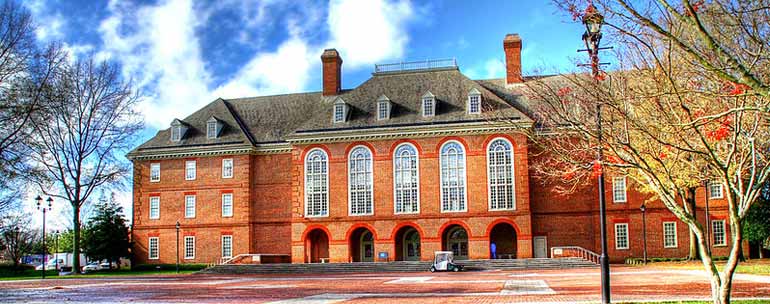
Regent University offers three bachelor’s degrees related to theology, including Biblical & Theological Studies, Christian Ministry, and Christian Leadership & Management.
Classes range from lasting 8 weeks to lasting 15 weeks, and 120 credits are required to graduate. Students 24 and older must take the programs online, while those that are younger may take classes online or on campus. All transcripts and test scores must be submitted when applying.
Regent University is accredited by the Southern Association of Colleges and Schools Commission on Colleges.
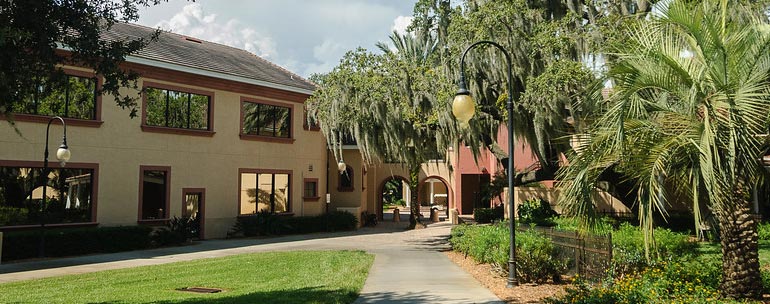
Southeastern University offers an online Bachelor of Science in Ministerial Leadership. Applicants must have a GPA of at least 2.0. The program offers four areas of concentration that students may choose: Biblical Studies, Christian Ministry, Humanitarian Ministry, and Pastoral Care and Counseling. Students must complete 120 credits to graduate.
Southeastern University is accredited by the Southern Association of Colleges and Schools Commission on Colleges.
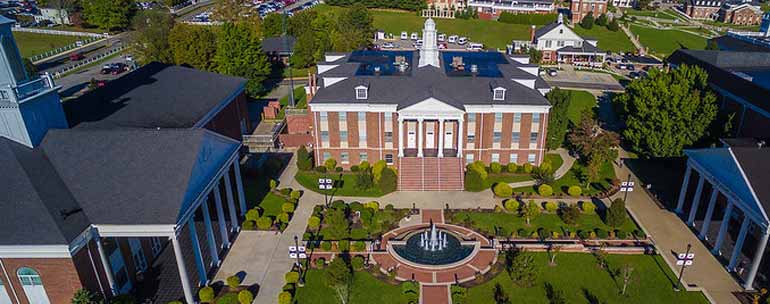
The University of the Cumberlands offers an online Bachelor’s in Missions and Ministry. To graduate, students must complete 120 credit hours, with the option of 12 elective classes from the School of Lifelong Learning. To apply, interested students must submit an online application with all official transcripts.
The University of the Cumberlands is accredited by the Southern Association of Colleges and Schools Commission on Colleges.
Start Now… Serve Faster!

A degree in theology does not necessarily require 4 years of classes, nor do you need to end up with $100,000 or more in debt. Does that make the path to ministry seem a little more doable?
You may follow your calling into service and still provide for your family by taking advantage of the cost-saving tips we’ve discussed. You might even be able to earn an accelerated online degree in theology or an online degree in religious studies in just 18-24 months!
Then where will you go, and who will you serve? Your degree can help open the doors to many opportunities.

